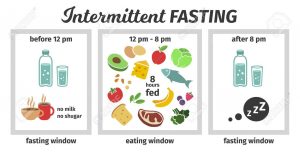Intermittent Fasting – A Primer
At it’s basic level, fasting is all about going without something. For some people, that means putting the “smart” devices away during meal. For others, time to turn off the television for a period of hour during the day or even, days during the week. But what most people think of when they “fast” is going without food. Maybe it’s one type of food, chocolate, for example. But Intermittent Fasting takes the concept to another level, even to the point of becoming a lifestyle.
The Basics of Intermittent Fasting
According to an article written by Geoff Price, intermittent fasting is “alternating periods of eating and not eating”. If you think about it, we already fast while sleeping and, according to Price, most people naturally fast between 8-12 hours each day. But Intermittent Fasting takes this one step further by increasing the number of hours between meals and/or limiting the number of meals each day. Ryan Andrews, Precision Nutrition, explains there are four types of Intermittent Fasting:

- Full- Day Fasting (23+ hours – Eat, Stop, Eat)
- Alternate Day Fasting (eat one day, fast the next)
- Partial Day Fasting “with an evening “eating window”” (19-20 hours fast/4-5 hours feast – Fast 5 and Warrior Diet)
- Partial Day Fasting with the majority of food intake planned around training time (Leangains)
Benefits to Intermittent Fasting
Price cites four benefits to this fasting approach:
Body Composition & Weight Management
Price notes that “In theory, the shortened window of eating time, combined with nutrient-dense, whole foods, limits the number of calories a person can and will eat during the day. ” But, Price also notes, you need a plan for the amount of calories, meals and putting your macro nutrients in the right priority. Check out this calculator from Precision Nutrition to help you.
 Appetite and Blood Sugar Control
Appetite and Blood Sugar Control
Price cites a University of Alabama study in 2018. The results indicated the group that ate earlier but within a specific time period lasting 6 hours “showed significantly lowered blood pressure, significantly lowered insulin levels, and increased insulin sensitivity.” There was also an apparent decrease in appetite.
Longevity & Disease Prevention
“Fasting effectively gives our cells a chance to clean-up waste products, so we don’t have a bunch of junk floating around, which can cause undue systemic inflammation and possibly lead to chronic disease.” But for this to work, the body needs time to expend the energy received from the previous meal, which, according to Price, could take 12-16 hours depending on the person.
Connection with Hunger Signals and Lifestyle Habits
Price notes most people who are successful with intermittent fasting can also:
- Recognize hunger and know it isn’t an emergency
- Have a plan built around their feeding window and meals
- Have a solid base build on sleep, some nutrition practice, stress management, and movement
Not So Fast…

Price explains that intermittent fasting is not for everyone including:
- Pregnant Women
- Chronically Stressed Individuals
- People with disordered eating
- People with disordered sleeping patterns
- Newcomers to diet and exercise
Both Helen Kollas, PhD, wrote a good article regarding this subject. Dr. Stacy Sims, PhD, wrote a book on the subject, ROAR: How to Match Your Food and Fitness to Your Unique Female Physiology for Optimum Performance, Great Health, and a Strong, Lean Body for Life
Is IF Necessary?
Price summarizes the article with this advice:
- Eat a diet that prioritizes variety in protein, vegetables, fruits, healthy fats, and enough starch to help support your physical activity.
- Move every single day and follow a progressive exercise program that challenges you, and most importantly, you enjoy.
- Prioritize sleep: Aim for 7-9 hours in bed, in a cool, dark room, with no electronic distractions.
- Have a strategy for stress management like practicing a hobby, meditating, journaling, praying, etc.
Price highly recommends anyone interested in trying intermittent fasting should read Experiments with Intermittent Fasting, on the Precision Nutrition website.
